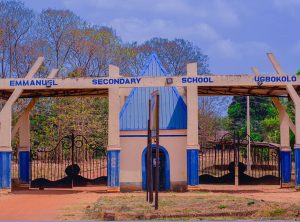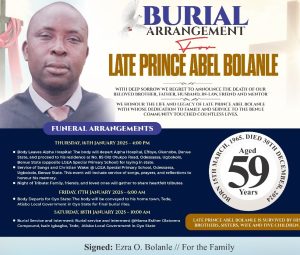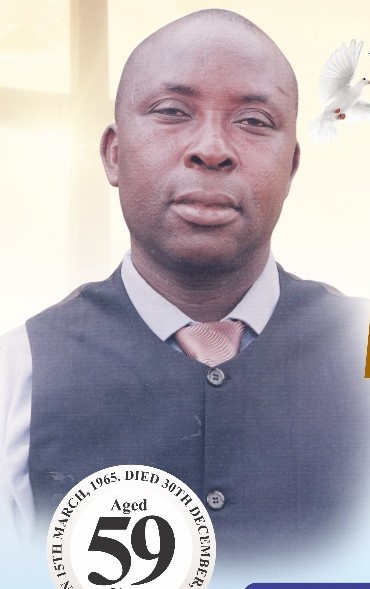The Ugbokolo community in Edemoga District of Okpokwu LGA in Benue State of Nigeria might be teaching Nigeria how to make strangers become natives. It is doing so by staging a special mourning for a Yoruba family that made Ugbokolo home over the past six decades if not more.
Prince Abel Bolanle, the stranger at the centre of the special communal mourning came to Ugbokolo as a mentee of the legendary Pa Ishaiah Falola who was the sole medium scale shop keeper at an incipient urbanizing Ugbokolo in the 1970s. Intervention recalls that fortune smiled on him in 1976 when Emmanuel Secondary School, Ugbokolo (ESSU) came first in WASC results in Benue State in 1976, transforming the sleepy place into a hub of attention from visitors curious to know more about the Catholic run, all-male secondary school.
 As if in recognition of that show of excellence, the Benue State Government chose Emmanuel Secondary School, Ugbokolo to host the newly established School of Basic Studies, Ugbokolo in the same 1976. Overnight, Ugbokolo transformed into a happening place, rubbing shoulders in name recognition with older and more established Catholic secondary schools such as Holy Rosary College, Adoka, St. Francis College, Otukpo, Mt St Michael Secondary School, Aliade and Mt St Gabriels, Makurdi.
As if in recognition of that show of excellence, the Benue State Government chose Emmanuel Secondary School, Ugbokolo to host the newly established School of Basic Studies, Ugbokolo in the same 1976. Overnight, Ugbokolo transformed into a happening place, rubbing shoulders in name recognition with older and more established Catholic secondary schools such as Holy Rosary College, Adoka, St. Francis College, Otukpo, Mt St Michael Secondary School, Aliade and Mt St Gabriels, Makurdi.
Mr Falola’s stature faced competition in a bigger and much more cosmopolitan Ugbokolo but his name had sedimented so powerfully that he remained the hegemon. Intervention would assert that this was partly because he was also a ‘doctor’, the first line of defence for students in need of attention when their ‘ailment’ would be a scandal in the college clinic. In any case, he, for a very long time, remained the source of daily newspapers in contrast with the day late supplies to the Staff Room which was not such an open space accessible by all sorts of students.
This is the background from which Prince Abel Bolanle derived his own communal stature as a nephew and key mentee of Falola. They are from Tede, Atisbo Local Government Area, Oyo State in Southwest Nigeria.
 The late Prince Abel who obviously struck the communal chord did so as a businessman, particularly pharmaceutical and medical equipment business, becoming a prominent medical supplier “known for his commitment to quality and service excellence”. But, more than that, he attended Benue Polytechnic Ugbokolo, the successor to the defunct School of Basic Studies (SBS). It is not very clear in the statement mourning him but the reference to him as “our in-law” suggests he married a local too.
The late Prince Abel who obviously struck the communal chord did so as a businessman, particularly pharmaceutical and medical equipment business, becoming a prominent medical supplier “known for his commitment to quality and service excellence”. But, more than that, he attended Benue Polytechnic Ugbokolo, the successor to the defunct School of Basic Studies (SBS). It is not very clear in the statement mourning him but the reference to him as “our in-law” suggests he married a local too.
“Prince Abel’s contributions to the development of the medical drug business in Ugbokolo market, Okpokwu Local Government of Benue State remains remarkable. His efforts in improving access to medical supplies and supporting local entrepreneurship earned him respect and admiration”, the approving statement said, indicating how his body would leave Alpha Hospital, Effoyo in Okonobo Clan on the outskirt of Ugbokolo to his residence at No. 85, Old Otukpo Road, Odessassa in Ugbokolo, Benue State (opposite LGEA Special Primary School) for laying in state on January 16th, 2025.
This will be followed by a Service of Songs and Christian Wake at LGEA Special Primary School, Odessassa, Ugbokolo, where prayers and reflections in his memory will take place in addition to a Night of Tribute “bringing together family, friends, and loved ones to share heartfelt memories” The following day, his corpse heads to Oyo State for final burial rites January 18th, 2025.
Late Prince Abel Bolanle is said to be survived by his brothers, sisters, wife, children, friends, and countless others who drew inspiration from his life. And his passing “is not only a loss to his immediate family but also to Ugbokolo, Benue State, and beyond”. It is not over yet. “As Ugbokolo mourns, his life stands as proof of the power of vision, hard work, humbleness and selfless contribution to others”.
The story of Prince Abel suggests that those who dream of breaking Nigeria on the pages of newspapers do not know Nigeria. In every corner of Nigeria, there is a Prince Abel. Until politicians instigate ethnic discord so as to win votes, Nigerians have no irreconcilable differences with each other which they do not immediately resolve.




























